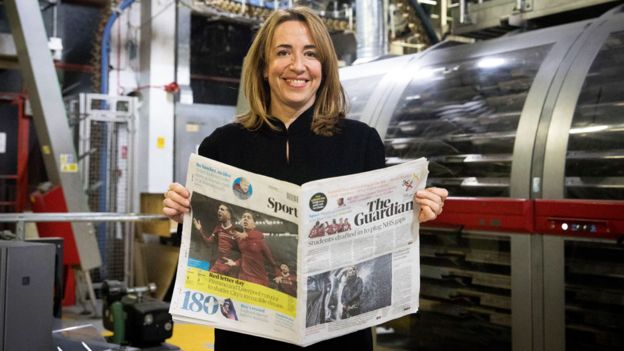
Honey, I Shrunk 'The Guardian'!
The first edition of The Guardian’s newer (and thinner) tabloid look was just published this week.
Britain's left-leaning and liberal daily has been put on a diet.
After breaking ground after nearly 184 years, The Guardian turned over a new page with the purchase of 80 million pounds worth of Berliner printing presses in 2005.
Now, a little over a decade since this initial “modern formatting” experiment, The Guardian has decided to slim down for 2018.
So far, their resolution has worked.
Because neither the elegance of typeface nor the paper cut potentiality of a newspaper has caloric content, what seems to be the motivation behind this diet?
What motivates most businesses: money.
For most of you humans, bots, and trolls reading this, newspapers thinning down may not seem like particularly enticing information to digest (especially if you’re not from the UK, the home of regal corgis, tea-time scones, and oh yeah, The Guardian).
But, the real story here isn’t the act of theoretically printing less, it’s why The Guardian was pushed to do so.
The Guardian is consistently ranked in the top five of United Kingdom newspapers for both its impressive net readership and print circulation numbers, attracting millions to thumb through its sections and scroll through its original posts. It has been integral in scooping some big-time news, such as revealing insights on phone hacking scandals, the PRISM surveillance program, and The Panama Papers.
Still, the outlet has not been insusceptible to the digital-first demands of the 21st century.
The paper lost 38 million pounds (roughly 53 million dollars) last year.
We’ve seen similar cautionary tales happen back on our side of the planet.
This past summer, The Village Voice, one of the nation’s first alternative weeklies lauded for its creativity and its strong emphasis on community, was forced to tighten its purse strings by converting to a completely digital format. This change came after sixty years of being known for its free papers, available for pick-up on the gritty corners of New York City.
RELATED CONTENT
Similarly, in 2014, Playboy made the decision to strip its smut- and, okay, cleverly written fiction and thoroughly researched articles -off of newsstands and onto the shelves of the Internet. For a while there, it even forwent publishing its infamous photographs of scantily clad celebrities and Playmates to attract a more sizeable audience on its website, ensuring that content remained “Safe For Work” and appropriate for social media sharing.
It should be noted that in 2017 the nudes came back because- as the adage goes -sex sells.
And, how could we forget, the death of Philadelphia City Paper in 2015? Rest in peace. Sometimes, even the best scoops and most original journalism can suffer under the tyranny of viral Buzzfeed quizzes and clickbait headlines.
In the survival game of 21st-century media, only those willing to keep up with the tech of the times will win.
Rebranding and redesigns can be pernicious though, or as BBC’s Media Editor Amol Rajan put it, “guilty until proven innocent.”
In a review Rajan wrote for the BBC, he stresses that even labeling as a tabloid could have negative connotations for The Guardian, delegitimizing it on an entirely superficial level. After all, tabloids tend to be… Trashy, replete with the type of articles that make you shudder for humanity (but also make you wonder whether Kylie Jenner is pregnant or not). These tabloids are replete with gossip, dramatic speculations, and catchy fluff pieces, which is exactly what The Guardian is not read for.
Rajan suggests that The Guardian nix the term “tabloid”, and opt for something more palatable for its audience, such as “compact”.
However, in a statement, Editor Katherine Viner said that, though it's shrunk in size to cut costs, The Guardian will not shrink in heart:
“Guardian journalism itself will remain what it has always been: thoughtful, progressive, fiercely independent, and challenging; and also witty, stylish, and fun.”
Its Sunday sister, The Observer, will be undergoing similar tabloid changes











LEAVE A COMMENT: